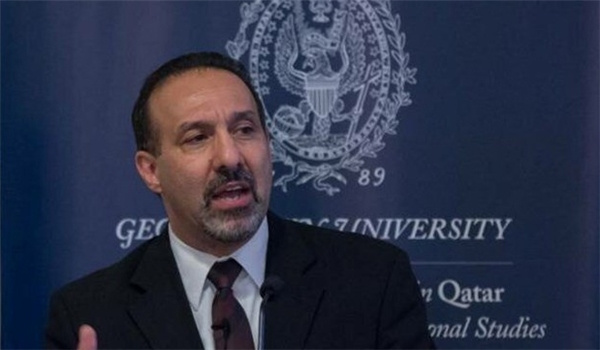Mehran Kamrava: US Persian Gulf Coalition to Fail

Mehran Kamrava, Professor and Director of the Center for International and Regional Studies at Georgetown University’s School of Foreign Service in Qatar, said the US efforts to form a coalition in the Persian Gulf to contain Iran's power will prove a failure.
Speaking in an exclusive interview with FNA, Professor Mehran Kamrava said the US has long tried various means to contain Iran's military presence and its influence in Persian Gulf region. In doing so, the Americans have not followed a coordinated, thoughtful, and long-term strategy and have always failed.
Mehran Kamrava is Professor and Director of the Center for International and Regional Studies at Georgetown University’s School of Foreign Service in Qatar. He is the author of a number of journal articles and books, including, most recently, Troubled Waters: Insecurity in the Persian Gulf (Cornell University Press, 2018); Inside the Arab State (Oxford University Press, 2018); The Impossibility of Palestine: History, Geography, and the Road Ahead (Yale University Press, 2016); Qatar: Small State, Big Politics (Cornell University Press, 2015); The Modern Middle East: A Political History since the First World War, 3rd ed. (University of California Press, 2013); and Iran’s Intellectual Revolution (Cambridge University Press, 2008). His edited books include The Great Game in West Asia: Iran, Turkey, and the Southern Caucasus (2017); Fragile Politics: Weak States in the Greater Middle East (2016); Beyond the Arab Spring: The Evolving Ruling Bargain in the Middle East (2015); The Political Economy of the Persian Gulf (2012); The Nuclear Question in the Middle East (2012); and The International Politics of the Persian Gulf (2011).
Below is the full text of the interview:
Q: The United States has moved to form a new military coalition in the Persian Gulf. What is the purpose of this coalition?
A: Over the years, the US has tried various means to contain Iran's military presence and its influence in Persian Gulf region. In doing so, the Americans have not followed a coordinated, thoughtful, and long-term strategy. And, despite pushing to make the Peninsula Shield a viable military force in the [P]GCC, they have failed to do so. This latest attempt, to create a new military coalition, appears to be part of yet another attempt by the United States — uncoordinated and without a long-term strategy — to maintain a military presence in the Persian Gulf and to share the costs of doing so. It does not appear to be heading for any meaningful success.
Q: The UK also first called for a seperate Persian Gulf coalition that was welcomed by France but rejected by Germany. Why do you think the UK called for a seperate coalition in the first place?
A: The Europeans have tried to distance themselves from the erratic, uncoordinated, and confrontational policies of the United States. This is not to say that European diplomacy has been any more successful, and clearly evident by the Grace 1 tanker debacle, which Britain now doesn’t know how to resolve. Nevertheless, the Europeans are eager to show a military presence, but at the same time distance from Donald Trump’s foreign policies.
Q: Another Plan for Persian Gulf security order was raised by the Russians that is close to Iranian views. The Russian plan merely envisages a supervisory or observer role for the trans-regional powers in the Persian Gulf. How practical do you believe this plan is?
A: In theory this plan makes a lot of sense, and the security of the region should be the responsibility of the regional actors. But in reality there is great mistrust among regional actors, especially when it comes to security issues. The recent announcement of collaborative security arrangements between Iran and the UAE is a very positive sign, and hopefully there will be more similar developments between Iran and Saudi Arabia. The smaller sheikhdoms of the Persian Gulf feel vulnerable to the military powers of countries like Iran and Saudi Arabia, and Iran and Russia and other actors need to do what they can to lessen this feeling of vulnerability and threat — unreasonable as they are — that the smaller states feel. Only then would a viable regional security arrangement be possible.
Q: Iran's proposed plan for the Persian Gulf is based on the establishment of security by the littoral states. How feasible is this plan, specially under the present circumstances?
A: Any viable and meaningful regional security arrangement needs to start with confidence-building measures. For several years now, Iranian diplomacy has been designed to reduce regional tensions and to build confidence among neighbors. For the longest time, the Saudis and the Emiratis were not willing to listen to the voices of calm and reasoned diplomacy coming out of Tehran. The tide seems to be turning in the UAE. And there are positive signs that Riyadh may also be reducing its animosity toward Iran. Let’s hope this trend continues.
Q: After 16 years, American troops returned to Saudi Arabia once again. How does this redeployment affect the security situation in the region?
A: This is more symbolic than militarily important. So far, the troop deployment has been only 500. But for the Americans it shows the expansion of their footprint in the Middle East, literally, and for the Saudis it ensures the continued acquisition of US military hardware at a time when the Congress is firmly opposed to it. As far as the security of the region is concerned, in the long run it makes the region only more insecure. No one likes foreign troops on their soil, and the people of Saudi Arabia are no exception. And the 500 troops are not going to enhance the security of the Kingdom, but only deepen its security dependence on the US. This is yet another ill-advised and short-sighted move by the Trump White House on the one side and by Mohammed bin Salman on the other.
Source: Tasnim

